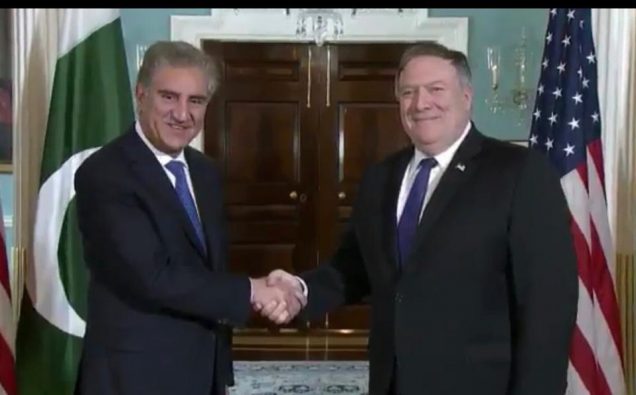
The United States and Pakistan see momentum for to advance Afghan peace process, with their top diplomats asking at a meeting in Washington that the Taliban should seize the opportunity for dialogue.
The call by the two sides for Afghan Taliban to join peace process came in separate statements issued after a meeting between Secretary of Sate Mike Pompeo and Foreign Minister Shah Mahmood Qureshi here at the State Department.
Both acknowledged the importance of U.S.-Pakistan relationship, saying it has been a factor for stability in South Asia.
“Secretary Pompeo underscored a common goal to advance peace and security in the broader region. In particular, Secretary Pompeo emphasized the important role Pakistan could play in bringing about a negotiated settlement in Afghanistan,” State Department spokesperson Heather Nauert said in a readout of Tuesday’s meeting.
“The Secretary agreed that there was momentum to advance the Afghan peace process, and that the Afghan Taliban should seize the opportunity for dialogue,” the statement added.
According to Pakistan’s Foreign Ministry, during the meeting Secretary Pompeo appreciated Pakistan’s support for political reconciliation in Afghanistan and its efforts for peace in the neighborhood.
“Both sides agreed that the time was ripe for the Afghan Taliban to avail the opportunity for a political settlement by seizing the opportunity for dialogue,” a statement released by the Pakistani embassy in D.C. said.
The two diplomats met as Afghanistan faced a spate of bombings amid Taliban insurgency and the ISIS attacks. Recently, Kabul had a brief ceasefire with the Afghan Taliban but the conflict-hit country has not yet been able to see a headway in peace talks. Pakistan, which has often been criticized for not doing enough to check the Afghan Taliban from using its territory, has promised to use “whatever” influence it has to push the Afghan peace process.
Pompeo’s emphasis on Pakistan’s role toward negotiated settlement reflects President Donald Trump’s expectation that Islamabad should help achieve the goal of resolving the 17-year-old conflict through talks.
During the meeting, the State Department said, Secretary Pompeo discussed the “importance of the United States and Pakistan working together to advance joint priorities, recognizing that bilateral cooperation was mutually beneficial and a factor for stability in South Asia.”
The two sides “agreed to remain engaged on these and other issues, and reiterated their desire to maintain constructive dialogue to advance shared interests.”
Pompeo looked forward to working with the new Pakistani government. This was the second meeting between Secretary Pompeo and FM Qureshi following their discussions in Islamabad last month.
Foreign Minister Qureshi, also met with U.S. National Security Adviser John Bolton, noted at the State Department meeting with Pompeo that Islamabad and Washington “shared a common desire for peace and stability in Afghanistan and the region at large.”
He reiterated Pakistan’s support for a political settlement in Afghanistan, noting that the use of force had failed to deliver results, according to Pakistani Foreign Office spokesman.
The foreign minister stressed that “peace in South Asia, which was a common goal of both the United States and Pakistan, would remain elusive until all disputes, including the core dispute of Jammu and Kashmir, are resolved.”
Earlier, Qureshi also apprised NSA Bolton of the Imran Khan government’s peace initiative with India and New Delhi’s sudden reversal of position after agreeing to hold bilateral talks.
In the context of achieving stability in South Asia, Foreign Minister Qureshi briefed Bolton about India’s aggressive posturing in the region, the Pakistani embassy said.
After initially agreeing to Prime Minister Imran Khan’s peace initiative, the government in India had caved into internal politics, Qureshi noted.
According to the embassy, FM Qureshi said Pakistan, on its part, remained committed to engaging India in a comprehensive peace dialogue to resolve all outstanding issues including the Jammu and Kashmir dispute.
















